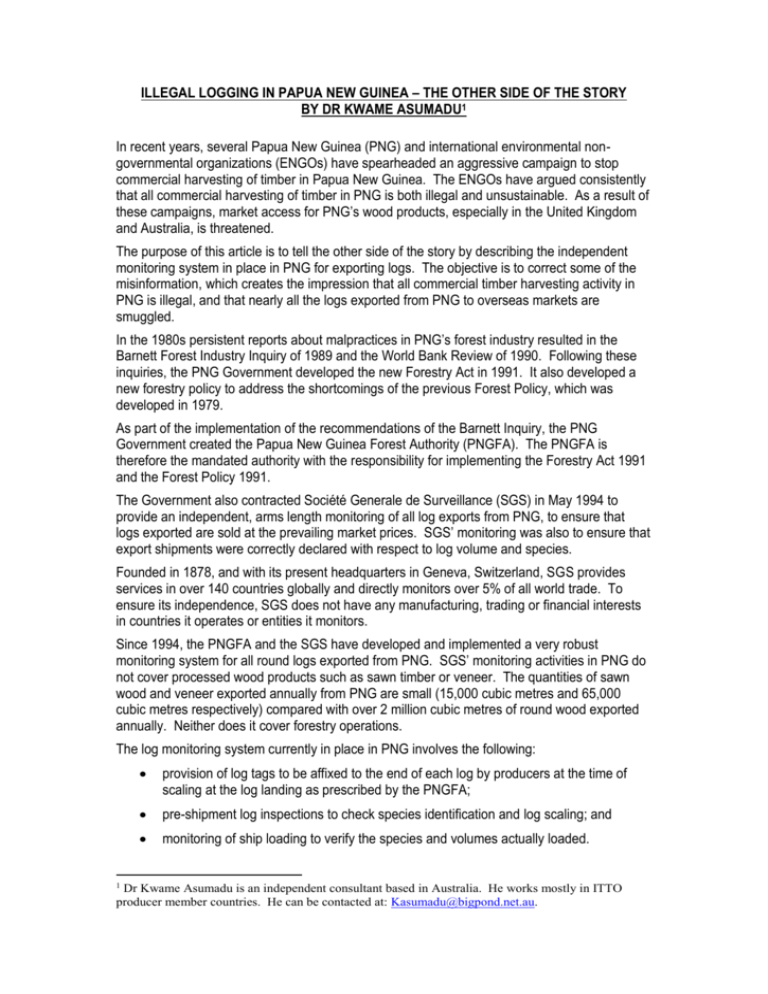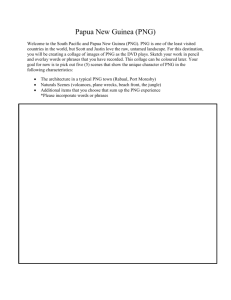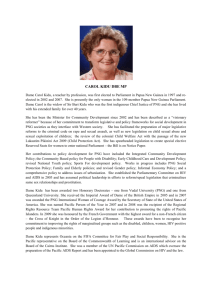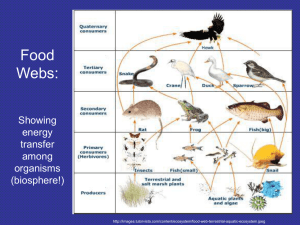the png forestry debate – the other side of the story
advertisement

ILLEGAL LOGGING IN PAPUA NEW GUINEA – THE OTHER SIDE OF THE STORY BY DR KWAME ASUMADU1 In recent years, several Papua New Guinea (PNG) and international environmental nongovernmental organizations (ENGOs) have spearheaded an aggressive campaign to stop commercial harvesting of timber in Papua New Guinea. The ENGOs have argued consistently that all commercial harvesting of timber in PNG is both illegal and unsustainable. As a result of these campaigns, market access for PNG’s wood products, especially in the United Kingdom and Australia, is threatened. The purpose of this article is to tell the other side of the story by describing the independent monitoring system in place in PNG for exporting logs. The objective is to correct some of the misinformation, which creates the impression that all commercial timber harvesting activity in PNG is illegal, and that nearly all the logs exported from PNG to overseas markets are smuggled. In the 1980s persistent reports about malpractices in PNG’s forest industry resulted in the Barnett Forest Industry Inquiry of 1989 and the World Bank Review of 1990. Following these inquiries, the PNG Government developed the new Forestry Act in 1991. It also developed a new forestry policy to address the shortcomings of the previous Forest Policy, which was developed in 1979. As part of the implementation of the recommendations of the Barnett Inquiry, the PNG Government created the Papua New Guinea Forest Authority (PNGFA). The PNGFA is therefore the mandated authority with the responsibility for implementing the Forestry Act 1991 and the Forest Policy 1991. The Government also contracted Société Generale de Surveillance (SGS) in May 1994 to provide an independent, arms length monitoring of all log exports from PNG, to ensure that logs exported are sold at the prevailing market prices. SGS’ monitoring was also to ensure that export shipments were correctly declared with respect to log volume and species. Founded in 1878, and with its present headquarters in Geneva, Switzerland, SGS provides services in over 140 countries globally and directly monitors over 5% of all world trade. To ensure its independence, SGS does not have any manufacturing, trading or financial interests in countries it operates or entities it monitors. Since 1994, the PNGFA and the SGS have developed and implemented a very robust monitoring system for all round logs exported from PNG. SGS’ monitoring activities in PNG do not cover processed wood products such as sawn timber or veneer. The quantities of sawn wood and veneer exported annually from PNG are small (15,000 cubic metres and 65,000 cubic metres respectively) compared with over 2 million cubic metres of round wood exported annually. Neither does it cover forestry operations. The log monitoring system currently in place in PNG involves the following: 1 provision of log tags to be affixed to the end of each log by producers at the time of scaling at the log landing as prescribed by the PNGFA; pre-shipment log inspections to check species identification and log scaling; and monitoring of ship loading to verify the species and volumes actually loaded. Dr Kwame Asumadu is an independent consultant based in Australia. He works mostly in ITTO producer member countries. He can be contacted at: Kasumadu@bigpond.net.au. Under the SGS monitoring system, no logs can be legally exported from PNG until all the prescribed procedures (involving 22 steps) have been followed. Checks and balances built into the system ensure that the next step cannot be completed until the preceding procedure has been fully certified by both the PNGFA and the SGS that all requirements have been duly complied with. According to SGS’ PNG General Manager, Mr Bruce Telfer, in the last 12 years, SGS has not uncovered large-scale log smuggling in the log export trade in PNG. SGS also provides monthly statistical reports to the relevant PNG government agencies on all log shipments. These statistical reports as well as records available at SGS office in Port Moresby can be verified independently, and they indicate that since 1995, SGS had inspected more than 25 million cubic metres of logs from 80 logging camps with an FOB value of more than 4.450 billion Kina. For these shipments, the PNGFA has certified that duties and taxes were paid, which has resulted in the PNG Internal Revenue Commission collecting a total of 1.362 billion Kina in revenue. Over the same period, the PNG Government earned additional foreign exchange totalling 354 million Kina, additional revenue of 265 million Kina and additional payments totalling 27 million Kina to landowners. Effective as it has been in minimising log smuggling, it cannot be said that the SGS monitoring system provides a guarantee that all forestry activities in PNG are legal. However, it is important to note that PNG is one of the few tropical timber producer countries, which have implemented such system to enhance forest law compliance. To the knowledge of the writer, the only other tropical timber producer countries that have implemented log-tracking systems are Ghana, Ecuador, Congo DRC, Cameroon, Guyana, Brazil and Peninsular Malaysia. The PNG and Cameroon systems appear to be the only ones, which are implemented and managed by an independently appointed body, at arms length from the government or the forest agency. Certainly, the SGS monitoring system in PNG provides a verifiable proof that allegations of rampant log smuggling are highly questionable. The ITTO’s Annual Review of the international tropical timber trade and trade discrepancies in 2005 indicated that the difference between the log export volumes reported by PNG authorities and Chinese importers was only 2%. China is the largest importer of PNG round logs. According to the ITTO, this discrepancy could be due to a number of factors including measurement and/or conversion errors, data entry errors, differences in custom classifications and differences in timing between the date of export compared with the date of import. The ITTO Annual Review also found that between 5 and 10% of trade discrepancies can be explained by FOB/CIF value. In any case, by themselves, trade discrepancies are not reliable indicators of illegal activity as discrepancies occur commonly in legitimate trade flows. World Bank claim that up to 70% of logs harvested in PNG was illegal was challenged by the PNGFA and the industry at a Regional Workshop of Forest Law Enforcement and Governance held in Port Moresby from 11th to 12th October. The resident World Bank country Manager in PNG has undertaken to seek verification of this claim from the Bank’s headquarters in New York. The effectiveness of the SGS monitoring system in PNG therefore questions the basis for the UK Timber Trade Federation’s advice to its members to boycott Chinese plywood made of tropical roundwood from PNG. According to Mr Telfer, the unique numbering system of SGS tags affixed to exported logs provides sufficient information which can enable the origins of individual logs to be traced back to the concession from where they were harvested. UK and 2 other overseas buyers who doubt the legality of the source of PNG logs are therefore able to verify this information from the SGS in Port Moresby. In relation to allegations that logs were being exported illegally from remote PNG islands, Mr Telfer indicated that this was highly unlikely. He explained that it is logistically impossible to secretly and fully load a ship either in the night or during the day without leaving some kind of evidence behind. In addition, it is logistically impossible to load a ship full of logs overnight. SGS has officers stationed on concessions where commercial harvesting of logs for export occurs. Currently, there are about 42 active log export sites in PNG. According to the organization, it is able to verify expeditiously any reports of illegal activities relating to the export of logs. Such checks have been carried out in the past and have not shown illegal activities by log exporters. PNG’s forest resources represent an important renewable and natural asset, which can be utilised on a sustainable basis to generate wealth in support of socio-economic development. Indeed, export earnings from forestry contributes significantly to government revenue, which underpin and enable a very large percentage of national and provincial government spending. In 1999, the World Bank estimated that the forestry sector in PNG contributed up to 8.6% to the country’s GDP. This figure has declined since the Asian financial crisis in the late 1990s. Nevertheless, the sector’s share of GDP has remained relatively constant since 1999, and has accounted between 3 and 5% of GDP. Over the last six years, annual foreign exchange earnings from forestry have averaged $US156 million or 361 million Kina. In 2005, foreign exchange earnings alone were $US173 million or 541 million Kina, which was 5% of the total merchandise exports (BPNG, 2005). This makes forestry second only to the mining and petroleum sector as an export earner. It also generated an average of 115 million Kina in log exports taxes over the past six years. The sector generates around 5% of PNG’s export, and for over a decade, it has contributed an average of 30% of PNG’s expenditure on development. PNGFA estimates that the sector directly employs 9,000 people, mainly in the rural areas. This represents about 4% of formal national employment. The sector’s contribution to national employment has declined by about 28% from its 1990’s level, when it employed directly around 13,000 people. In addition, the sector is a major contributor to rural infrastructure development – roads, airfields, air services, health clinics, services and schools. While eco-forestry has a place in PNG, the majority of the key local NGOs agree that commercial timber harvesting is important for the PNG economy and should continue albeit on a sustainable basis. This view was confirmed to the writer at a meeting held with key representatives of the local ENGOs in Port Moresby on 17th October 2006. PNG now has a framework in place, which can assist in achieving sustainable forest management, as well as enhanced forest law enforcement and governance. It has a Forest Act, a Forest Policy and a Code of Forest Harvesting. Like many tropical timber producing countries, the major challenge facing PNG is effective implementation of its forest law and policies, as well as monitoring to ensure continuous improvement. ITTO’s recent study into the progress made in sustainable forest management in tropical timber producing countries concluded that while progress had been made overall, there was still room for improvement in almost all the member producer countries. The fact that PNG can further improve its performance in sustainable forest management cannot be used to justify allegations that all commercial harvesting activities in the country are illegal. In the writer’s view, there has been a tendency to confuse “illegality” with “effective 3 implementation” of the Forest Act and related policies and guidelines in the commercial timber harvesting debate in PNG. One area definitely requiring immediate action is the definition of illegal harvesting activities in the context of PNG’s forestry law and policy. At present, there is no agreed national definition of illegal harvesting activities in PNG. The PNGFA generally uses the FAO/ITTO definition, which is the “harvesting, transporting, processing, and trading of forest products in violation of national laws.” It would be useful if this definition can further be expanded in the context of PNG to identify specific activities which would constitute illegality in the context of PNG’s Forestry Act 991 and the Forest Policy 1991. In the absence of an agreed national definition of illegality, commercial timber harvesting activities in PNG are being judged based on the Greenpeace’s definition, which has been adopted by the local ENGOs. Under the Greenpeace’s definition, commercial timber harvesting activities are not legal unless the operations have met all laws and regulations and international treaties including labour rights, indigenous people’s rights and the payment of all taxes and fees. This is a much broader definition and encompasses areas of responsibility, which are beyond the mandate of the PNGFA. Based on this definition, it would be fair to conclude that commercial timber harvesting activities in almost all timber producing countries in the world– both developed and developing – can be said to be illegal in one aspect or the other. This being the case, is there any justification in singling out PNG? 4








